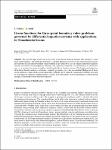Item Infomation
Full metadata record
| DC Field | Value | Language |
|---|---|---|
| dc.contributor.author | L. P., Kiss | - |
| dc.contributor.author | G., Szeidl | - |
| dc.date.accessioned | 2023-05-25T01:32:43Z | - |
| dc.date.available | 2023-05-25T01:32:43Z | - |
| dc.date.issued | 2023 | - |
| dc.identifier.uri | https://link.springer.com/article/10.1007/s00707-023-03502-9 | - |
| dc.identifier.uri | https://dlib.phenikaa-uni.edu.vn/handle/PNK/8502 | - |
| dc.description | CC BY | vi |
| dc.description.abstract | The present paper is devoted to the issue of the Green function matrices that belongs to some three-point boundary- and eigenvalue problems. A detailed definition is given for the Green function matrices provided that the considered boundary value problems are governed by a class of ordinary differential equation systems associated with homogeneous boundary and continuity conditions. The definition is a constructive one, i.e., it provides the means needed for calculating the Green function matrices. The fundamental properties of the Green function matrices—existence, symmetry properties, etc.—are also clarified. Making use of these Green functions, a class of three-point eigenvalue problems can be reduced to eigenvalue problems governed by homogeneous Fredholm integral equation systems. The applicability of the novel findings is demonstrated through a Timoshenko beam with three supports. | vi |
| dc.language.iso | en | vi |
| dc.publisher | Springer | vi |
| dc.subject | Green functions | vi |
| dc.subject | Timoshenko beams | vi |
| dc.title | Green functions for three-point boundary value problems governed by differential equation systems with applications to Timoshenko beams | vi |
| dc.type | Book | vi |
| Appears in Collections | ||
| OER - Kỹ thuật điện; Điện tử - Viễn thông | ||
Files in This Item:

